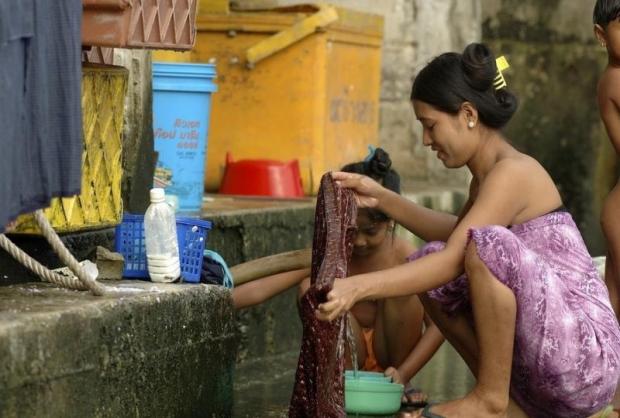
Having worked as a domestic helper for a Thai family for five years, Kon has blended in well with her neighbourhood. Most people are not aware she is a migrant worker.
Each day she rides a bicycle to a nearby market to buy things for the family and then delivers food to her employer's mother who lives in a nearby neighbourhood. She gets extra pay for such food deliveries in addition to an 8,000-baht salary.
After all, she's one of a million or more migrant housemaids who have served Thai families in recent decades. Migrant domestic workers usually receive little respect, even though Thai families depend on their labour.
It is estimated that at least 50% of domestic workers in Thailand are migrants from Cambodia, Myanmar and Laos, 90% of whom earn less than the minimum wage, according to the International Labour Organisation (ILO).
According to the World Bank, annual remittances sent by migrant workers living in Thailand back to their respective countries came to US$3.1 billion in 2014.
But Kon, 41, from Laos' Savannakhet province, may be a little luckier than others.
"Things have been much easier and transparent in the past three to four years after the Ministry of Labour issued a regulation recognising the rights of the domestic helpers, which also applies to migrant workers. But there's still a lot to be done in order to translate nice words into reality," she said.
How does she know about the 2012 ministerial regulation? Information on migrants' rights is included in the work permit renewal application form, translated into several languages.
They can learn about what rights they are entitled to, such as weekly days off and annual holiday, sick leave and overtime payments. But the key problem of the labour law is its implementation, leaving room for employers to exploit migrant workers.
"In some houses, migrants have to wake up at night and iron clothes or heat up food for their boss," she said.
Kon said recruiters are aware of the minimum wage of 300 baht that their employees are entitled to earn, but are rarely paid that much.
"Many usually receive no overtime payments, and sometimes employers deduct medical bills from their wages. Like Thai housemaids, the fate of migrant domestic helpers lies in the hands of each individual employer," she said.
Before crossing the Mekong River to Thailand 19 years ago after her husband, a police officer, died, Kon worked on her parents' rice field.
"I followed my relatives to Thailand, as many of my compatriots came here through recruiters -- mostly unlicensed. My two sons are grown up -- 21 and 24 years old -- and have been working in Thailand too," said Kon.
Each year she sends some 50,000 baht back to her family in Laos. "I save some for myself; I bought a Thai insurance policy that can support me when I go back to Laos," she said.
The plight of female migrants who work in the construction sector is worse. Most of them are denied social protection and occupational safety.
Nonetheless, the ILO's recent publication, "High Rise, Low Pay", acknowledges that many of the women were clearly informed about what they could expect when entering the construction sector in comparison to other options they had tried such as plantation labourers, factory workers, and domestic helpers.
"It would appear to be one of the 'least bad' options for a lot of migrant women working in Thailand," the report says.
The ILO launched this publication and another report to mark International Migration Day tomorrow, highlighting discrimination against women migrants in construction and domestic work in Thailand.
Domestic work is an informal and largely female-dominated sector, whereas construction is largely male-dominated and a significant part of the formal economy.
One thing in common, the two reports said, is that the work performed by women in both sectors is undervalued, as demonstrated by the low wages they receive.
Another ILO report, "Worker, Helper, Auntie, Maid?", reveals that 90% of the women surveyed were paid lower than the minimum wage.
Although Thailand ratified the ILO's Equal Remuneration Convention 1951, women construction workers still receive wages lower than their male counterparts even though they take on the same job.
Social attitudes, as expressed in the media and by employers, toward domestic work as an innately female role that women perform as "helpers" or as "part of family" have excluded them from labour rights and social protection.
Both employers and government officials interviewed for the ILO report emphasised the family model as culturally appropriate for Thailand.
These women in construction and domestic work are also overworked and insufficiently protected. For example, those providing care to certain family members end up working 13.5 hours each day on average. Domestic workers are also excluded from maternity benefits and from the protection of unfair dismissal if they are pregnant.
Migrant women who work at construction sites have expressed fear of on-the-job injuries. Few employers provide safety equipment to migrant workers.
While Thai laws allow maternity leave for construction workers, employers were found to have regularly dismissed pregnant women.
The reports suggested that the cost of recruiting and employing migrant workers in the construction sector should be shouldered by employers, rather than employees, and that migrant workers should receive improved standards of housing and working conditions and be entitled to the minimum wage.
Domestic workers should be provided with labour protection and security benefits as prescribed by law.
"It would be helpful if labour officials conducted an annual audit at homes or construction sites to ensure employers at home or outdoors are abiding by the laws," said Kon before getting back to her daily household chores.
